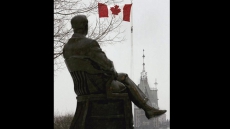OTTAWA — The RCMP watchdog says Mounties improperly took guns from flood-stricken homes in Alberta two years ago — seizures that angered High River residents and fostered mistrust of the national police force.
In a report released Thursday, the Civilian Review and Complaints Commission blamed the mistakes on poor leadership, lack of guidance, and failure to communicate with the public.
The RCMP had legal authority to forcibly enter evacuated homes during the natural disaster and even to seize loose firearms in plain view, the commission report says.
The Mounties say the guns could have posed a hazard, as there were reports of break-ins and thefts, and over 300 people — including one high-risk offender — refused to evacuate.
Under the Criminal Code, such seizures did not require a warrant, but officers failed to take the necessary next step of reporting their actions to a judge.
In addition, RCMP members exceeded their authority by seizing some guns that were properly secured or that were not "in plain view," the commission found.
In all, 609 firearms were taken from 105 homes.
"While RCMP members, acting on their own initiative and with little guidance, may have acted with public safety in mind, they nonetheless failed to comply with legal requirements concerning the seizure of firearms," the report said.
In June 2013, heavy rainfall caused the Highwood River to swell, uprooting trees and engulfing cars and homes. During the crisis, the RCMP, provincial and municipal police, the military, first responders and volunteers rescued some 800 people.
Overall, emergency personnel, including the Mounties, did "a remarkable job" in the initial days, the report said.
What should have been a story about heroic actions of many RCMP members during the devastating flood turned out to be "something far different" for the force, the commission noted.
The commission said RCMP leadership failed to adequately plan for communications with the public during the catastrophe, which prompted difficulties when word of the forced entries and seizures began circulating.
"What we found was that, all too often, social media filled the gap that the communications people were unable to fill," commission chairman Ian McPhail said in an interview.
"And in some instances contradictory or incomplete information was communicated to the public."
The report makes several recommendations, including creation of:
— a national crisis communications handbook;
— guidelines on seizure of firearms, ammunition and contraband during disasters;
— special forms to ensure better note-taking about forced entries.
The report confirmed that the federal government's "grave concerns" over firearm seizures during the flood were justified, said Jason Tamming, a spokesman for Public Safety Minister Steven Blaney.
"Some of the activities described in the report are completely unacceptable," Tamming said. "Law-abiding Canadians should never be faced with unlawful searches and seizure of their personal property."
The complaints commission will issue a final report once the RCMP responds.
In an initial statement Thursday, RCMP Commissioner Bob Paulson saluted members' efforts during the disaster. "Our police officers — many directly affected by the devastation themselves — worked long, stressful and emotionally charged hours to keep their community safe."
Paulson said the Mounties had begun reviewing the report, adding there is "always room for improvement."
McPhail said he would be surprised if the recommendations are not accepted and implemented.
"They're all doable. They don't require huge expense," he said. "They simply require a more focused attention to how to respond to natural disaster situations."





